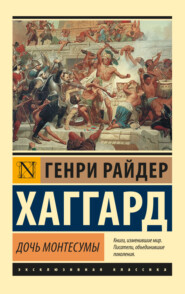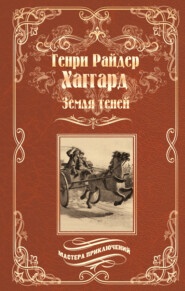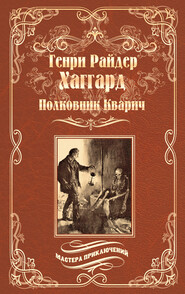По всем вопросам обращайтесь на: info@litportal.ru
(©) 2003-2024.
✖
Joan Haste
Настройки чтения
Размер шрифта
Высота строк
Поля
Her tone frightened Edward, and he stammered -
“Do you really think so? You are so clever that I should have thought that you must have seen it coming for a long while. I know I have only just been able to prevent myself from proposing on two or three occasions – no, that’s a mistake, I don’t mean that. Oh! there! Ellen, will you have me? I know that you are a great deal too good for me in a way – ever so much cleverer, and all that sort of thing; but I am truly fond of you, I am really. I am well off, and I know that you would be a credit to me and help me on in the world, for I want to go into Parliament some time, and – there, I think that is all I have got to say.”
Ellen considered this speech rapidly. Its manner was somewhat to seek, but its substance was most satisfactory and left nothing to be desired. Accordingly she concluded that the time had come when she might with safety unbend a little.
“Really, Mr. Milward,” she said in a softer voice, and looking for a second into his eyes, “this is very flattering to me, and I am much touched. I can assure you I had no idea that my friend had become a” – and Ellen hesitated and even blushed as she murmured the word – ”lover. I think that perhaps it would be best if I considered your offer for a while, in order that I may make perfectly sure of the state of my own feelings before I allow myself to say words which would be absolutely irrevocable, since, were I once to pledge myself – — ” and she ceased, overcome.
“Oh! pray don’t take time to consider,” said Edward. “I know what that means: you will think better of it, and tell me to-morrow that you can only be a sister to me, or something of the sort.”
Ellen looked at him a while, then said, “Do you really understand what you ask of me, and mean all you say?”
“Why, of course I do, Ellen: I am not an idiot. What do you suppose I should mean, if it is not that I want you to marry me?”
“Then, Edward,” she whispered, “I will say yes, now and for always. I will be your wife.”
“Well, that’s all right,” answered Edward, wiping his brow with his pocket-handkerchief. “Why couldn’t you tell me so at first, dear? It would have spared me a great deal of agitation.”
Then it occurred to him that further demonstrations were usual on these occasions, and, dropping the handkerchief, he made a somewhat clumsy effort to embrace her. But Ellen was not yet prepared to be kissed by Mr. Milward. She felt that these amatory proceedings would require a good deal of leading up to, so far as she was concerned.
“No, no,” she murmured – ”not now and here: I am upset.” And, withdrawing her cheek, she gave him her hand to kiss.
It struck Edward that this was a somewhat poor substitute, more especially as she was wearing dogskin gloves, whereon he must press his ardent lips. However, he made the best of it, and even repeated the salute, when a sound caused him to look up.
Now, the scene of this passionate encounter was in a lane that ran from the main road to the coast; moreover, it was badly chosen, for within three paces of it the lane turned sharply to the right. Down this path, still wrapped in silence, came Henry and Emma, and as Edward was in the act of kissing Ellen’s hand they turned the corner. Emma was the first to perceive them.
“Oh!” she exclaimed, with a start.
Then Henry saw. “What the deuce – -!” he said.
Ellen took in the situation at a glance. It was discomposing, even to a person of her considerable nerve; but she felt that on the whole nothing could have happened more opportunely. Recovering themselves, Henry and Emma were beginning to advance again, as though they had seen nothing, when Ellen whispered hurriedly to her fiancé:
“You must explain to my brother at once.”
“All right,” said Edward. “I say, Graves, I dare say you were surprised when you saw me kissing Ellen’s hand, weren’t you?”
“Yes, Mr. Milward, I was surprised.”
“Well, you won’t be any more when I tell you that we are engaged to be married.”
“Forgive me,” said Henry, somewhat icily: “I am still surprised.” And in his heart he added, “How could Ellen do it! – how could she do it!”
Guessing what was passing in his mind, his sister looked at him warningly, and at that moment Emma began to murmur some confused congratulations. Then they set out homewards. Presently Ellen, who was a person of decision, and thought that she had better make the position clear without delay, managed to attach herself to her brother, leaving the other two to walk ahead out of hearing, much to their mutual disgust.
“You have not congratulated me, Henry,” she said, in a steady voice.
“Congratulated you, Ellen! Good Lord! how can I congratulate you?”
“And why not, pray? There is nothing against Mr. Milward that I have ever heard of. His character is irreproachable, and his past has never been tarnished by any excesses, which is more than can be said of many men. He is well born, and he has considerable means.”
“Very considerable, I understand,” interrupted Henry.
“And, lastly, he has a most sincere regard for me, as I have for him, and it was dear Reginald’s greatest wish that this should come about. Now may I ask you why I am not to be congratulated?”
“Well, if you want to know, because I think him insufferable. I cannot make out how a lady like yourself can marry such a man just for – — ” and he stopped in time.
By this time Ellen was seriously angry, and it must be admitted not altogether without cause.
“Really, my dear Henry,” she said, in her most bitter tones, “I am by no means sure that the epithet which you are so good as to apply to Mr. Milward would not be more suitable to yourself. You always were impossible, Henry – you see I imitate your frankness – and certainly your manners and temper have not improved at sea. Please let us come to an understanding once and for all: I mean to marry Mr. Milward, and if by chance any action or words of yours should cause that marriage to fall through, I will never forgive you. On reflection you must admit that this is purely my own affair. Moreover, you are aware of the circumstances of our family, which by this prudent and proper alliance I at any rate propose to do my best to improve.”
Henry looked at his stately and handsome sister and the cold anger that was written on her face, and thought to himself, “On the whole I am sorry for Milward, who, whatever his failings may be, is probably an honest man in his way.” But to Ellen he said:
“I apologise. In nautical language, I come up all I have said. You are quite right: I am a bear – I have often thought so myself – and my temper, which was never of the best, has been made much worse by all that I have seen and learned since I returned home, and because I am forced by duty to leave my profession. You must make allowances for me, and put up with it, and I for my part will do my best to cultivate a better frame of mind. And now, Ellen, I offer you my warm congratulations on your engagement. You are of an age to judge for yourself, and doubtless, as you say, you know your own business. I hope that you may be happy, and of course I need hardly add, even if my prejudice makes him uncongenial to me, that I shall do my best to be friendly with Mr. Milward, and to say nothing that can cause him to think he is not welcome in our family.”
Ellen heard and smiled: once more she had triumphed. Yet, while the smile was on her face, a sadness crept into her heart, which, if it was hard and worldly, was not really bad; feeling, as she did, that this bitterly polite speech of her brother’s had shut an iron door between them which could never be reopened. The door was shut, and behind her were the affectionate memories of childhood and many a loving delusion of her youth. Before her lay wealth and pride of place, and every luxury, but not a grain of love – unless indeed she should be so happy as to find the affection whereof death and the other circumstances of her life and character had deprived her, in the hearts of children yet to be. From her intended husband, be it noted, when custom had outward his passion and admiration for her, she did not expect love even in this hour of her engagement, and if it were forthcoming she knew that from him it would not satisfy her. Well, she knew also if she had done with “love” and other illusions, that she had chosen the better part according to her philosophy.
Chapter 8
Two Conversations
On arriving at the Hall, Ellen went at once to her mother’s room, while Edward retired to the library, where he was informed that Sir Reginald was to be found. Lady Graves received the news of her daughter’s engagement kindly, but without emotion, for since her son’s death nothing seemed to move her. Sir Reginald was more expansive. When Edward told him that he was engaged to Ellen, he took his hand and shook it warmly – not, indeed, that he had any especial affection for that young man, whose tone and manners did not chime in with his old-fashioned ideas of gentlemanly demeanour, but because he knew his wealth to be large, and rejoiced at the prospect of an alliance that would strengthen the tottering fortunes of his family.
Edward had always been a little afraid of Sir Reginald, whose stately and distant courtesy oppressed him, and this fear or respect stood the older man in good stead on the present occasion. It enabled him even to explain that Ellen would inherit little with as much dignity as though he were announcing that she had ten thousand a year in her own right, and, striking while the iron was hot, to extract a statement as to settlements.
Edward mentioned a sum that was liberal enough, but by a happy inspiration Sir Reginald hummed and hawed before making any answer – whereupon, fearing opposition to his suit, his would-be son-in-law corrected himself, adding to the amount he proposed to put into settlement a very handsome rentcharge on his real property in the event of his predeceasing Ellen.
“Yes, yes,” said Sir Reginald. “I think your amended proposal proper and even generous. But I am no business man – if I had been, things would be very different with me now – and my head for figures is so shockingly bad that perhaps you will not mind jotting down what you suggest on a piece of paper, so that I can think it over at my leisure and submit it to my lawyers. And then, will it be too much trouble to ask you to find Ellen, as I should like to congratulate her?”
“Shall I go at once? I can do the writing afterwards,” suggested Edward, with an instinctive shrinking from the cold record of pen and ink.
“No, no,” answered the old gentleman testily; “these money matters always worry me” – which was true enough – ”and I want to be done with them.”
So Edward wrote first and went afterwards, albeit not without qualms.
The sight of his lawyer’s face when he explained to him the terms of settlement on his intended marriage, that he himself had propounded in black and white, amply justified his doubts.
“Well, I never!” said the man of law; “they must know their way about at Rosham Hall. However, as you have put it in writing, you cannot get out of it now. But perhaps, Mr. Milward, next time you wish to make proposals of settlement on an almost penniless lady, you will consult me first.”
That night there was more outward show of conviviality in the cold Hall dining-room than there had been for many a day. Everybody drank champagne, and all the gentlemen made speeches with the exception of Henry, who contented himself with wishing health and happiness to Edward and his sister.
“You see,” Mr. Levinger whispered to him in the drawing-room, “I did well to caution you to be patient with the foibles of your future brother-in-law, and I was not far out in a surmise that at the time you may have thought impertinent.”
Henry shrugged his shoulders and made no answer.
After dinner Lady Graves, who always retired early, vanished to her room, Sir Reginald and Mr. Levinger went to the library, and Henry, after wandering disconsolately for a while about the great drawing-room, in a distant corner of which the engaged couple were carrying on a tête-à- tête, betook himself to the conservatory. Here he chanced upon Emma.
To-night she was dressed in white, wearing pearls upon her slender neck; and seated alone upon a bench in the moonlight, for the conservatory was not otherwise illuminated, she looked more like a spirit than a woman. Indeed, to Henry, who came upon her unobserved, this appearance was much heightened by a curious and accidental contrast. Immediately behind Emma was a life-sized marble replica of one of the most beautiful of the statues known to ancient art. There above this pale and spiritual maiden, with outstretched arms and alluring lips stood the image of Aphrodite, triumphing in her perfect nakedness.
Henry looked from one to the other, speculating as to which was the more lovely of these types of the spirit and the flesh. “Supposing,” he thought to himself, “that a man were obliged to take his choice between them, I wonder which he would choose, and which would bring him the greater happiness. For the matter of that, I wonder which I should choose myself. To make a perfect woman the two should be merged.”

















